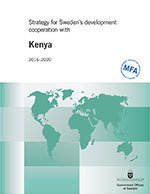Strategy for Sweden’s development cooperation with Kenya, 2016–2020 Reference No.: UD 16.022
Published

Within the framework of this strategy, Swedish development cooperation with Kenya is to contribute to a better environment, limited climate impact and strengthened resilience, the democratic development of society and improved opportunities for poor people to support themselves.
Download:
Development cooperation is also to contribute to the prevention of conflicts in Kenyan society. In addition, it is to support a transition from development cooperation to broader economic relations. The strategy will apply to the period 2016–2020 and comprises a total of SEK 1 750 million.
Swedish development cooperation within the framework of the strategy is expected to contribute to:
A better environment, limited climate impact and greater resilience to environmental impacts, climate change and natural disasters
- Strengthened management of natural resources and ecosystem services
- Improved capacity of public institutions and other actors at national and local level to contribute to environmental sustainability, increased resilience to environmental impacts, climate change and natural disasters, and reduced climate impact
- Increased production of and improved access to renewable energy
- Improved access to environmentally sustainable basic services
Strengthened democracy and gender equality, and greater respect for human rights
- Strengthened democratic institutions at national and local levels
- Strengthened rule of law
- Strengthened media and civil society capacity to promote democratic development and accountability
- Strengthened capacity among public institutions and civil society organisations that promote gender equality and respect for human rights, with a focus on women and girls
Better opportunities and tools to enable poor people to improve their living conditions
- Increased productivity, sustainability and processing in small- scale agriculture
- Improved opportunities – particularly for women and young people – for productive employment with decent working conditions
- Improved access to social protection for people living in poverty
- Strengthened conditions for free and fair trade and investments that benefit sustainable development

 X
X